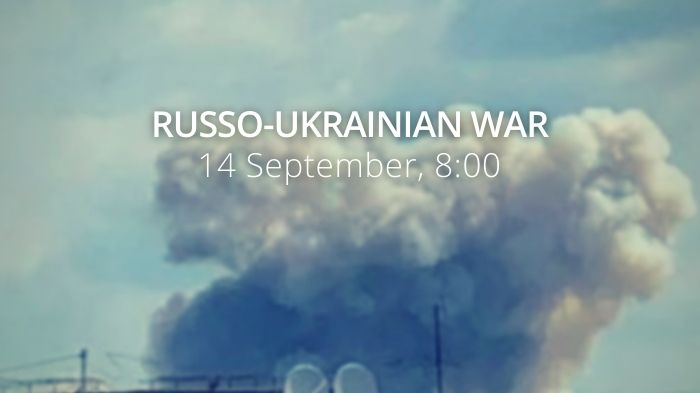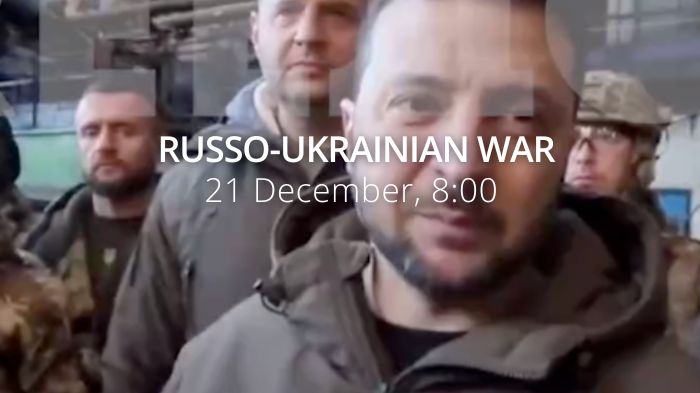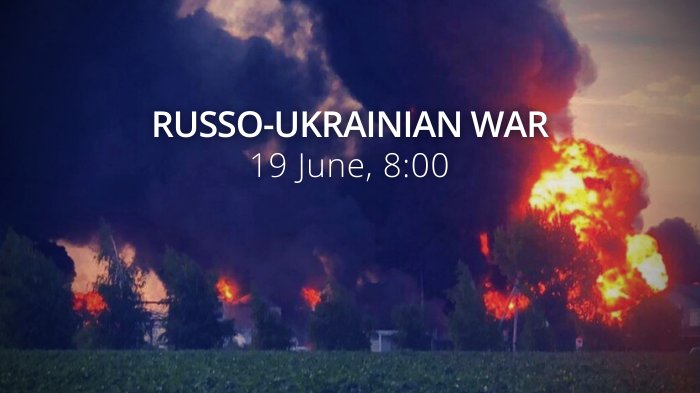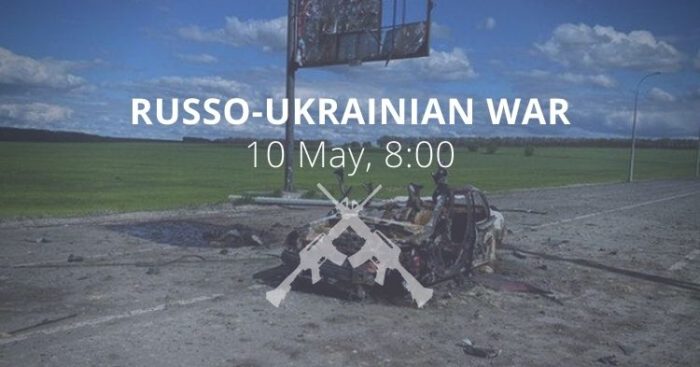The Ukrainian army liberated territory with a total area of 8,000 square kilometers and continue ground maneuvers in Kherson Oblast as part of the southern counter-offensive. Russian troops are reported to leave Melitopol. 300 settlements and 150,000 population liberated in the Kharkiv Oblast. Russian troops made incremental gains south of Bakhmut and continued ground attacks throughout Donetsk Oblast. For the first time since the start of the war, Kremlin recognizes its defeat in Kharkiv Oblast. Fake news about school teachers from the Russian Federation being detained in the liberated territories in the Kharkiv Oblast spread on social media. The Russian military set up torture rooms and kept Ukrainian citizens for extended periods of time. Mass graves discovered in Balakliya. Ukrainian forces provided the first visual evidence of Russian forces using an Iranian-made drone in Ukraine. The Kremlin blames Putin's military advisors. Russia not to enforce a violated ceasefire between Armenia and Azerbaijan or send the Russia-dominated Collective Security Treaty Organization in its defense. The IMF allocated $1.4 billion in financial support to Ukraine.
Daily Review, September 14 2022
A map of the approximate situation on the ground in Ukraine as of 00:00 14/09/22. pic.twitter.com/Uo5vbD4xud
— War Mapper (@War_Mapper) September 14, 2022
The General Staff’s operational update regarding the Russian invasion as of 06.00 am, September 9, 2022 is in the dropdown menu below.
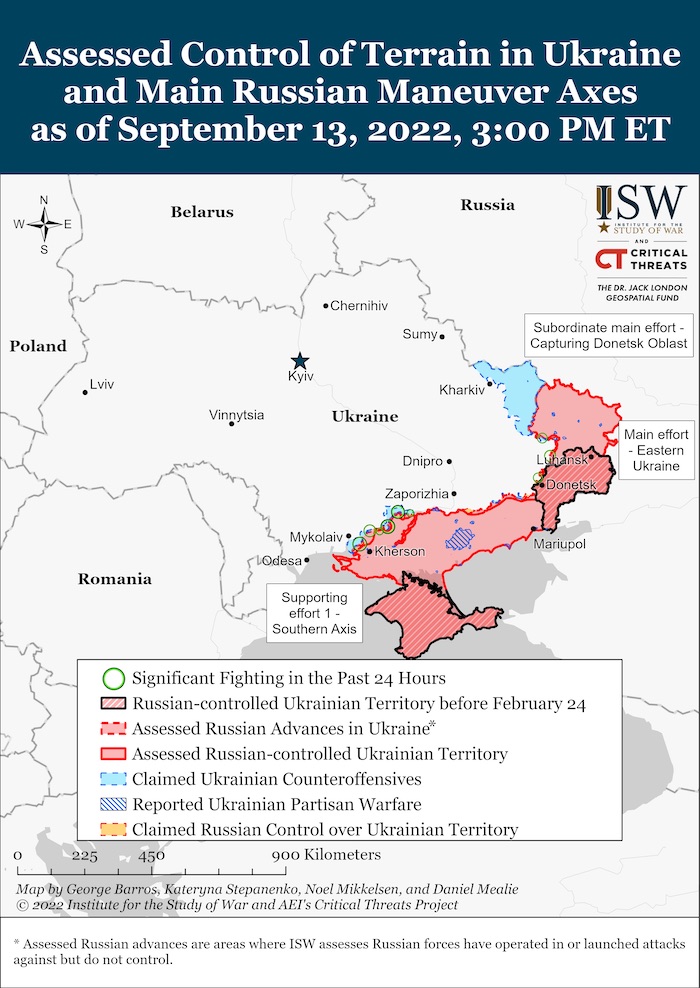
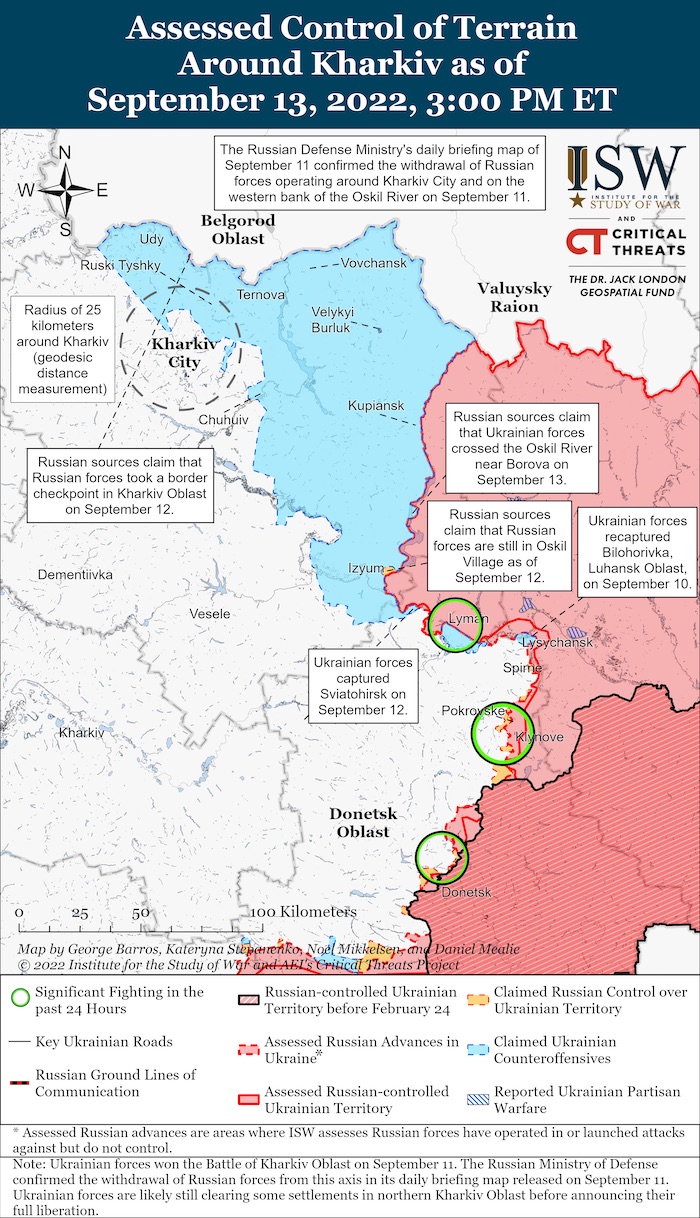
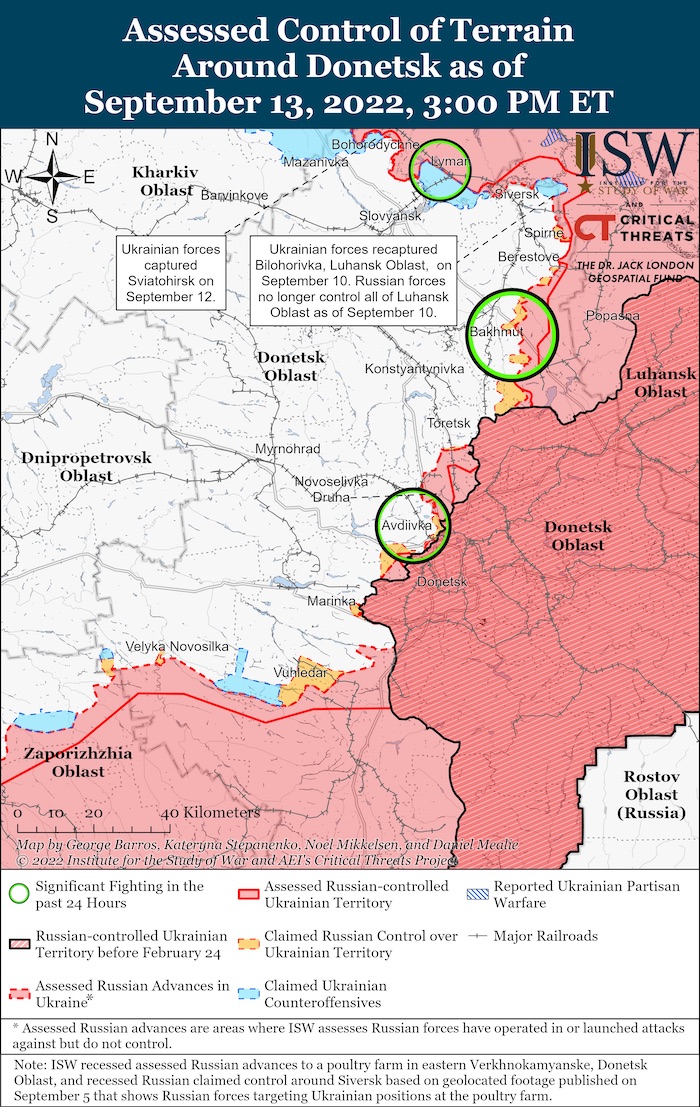
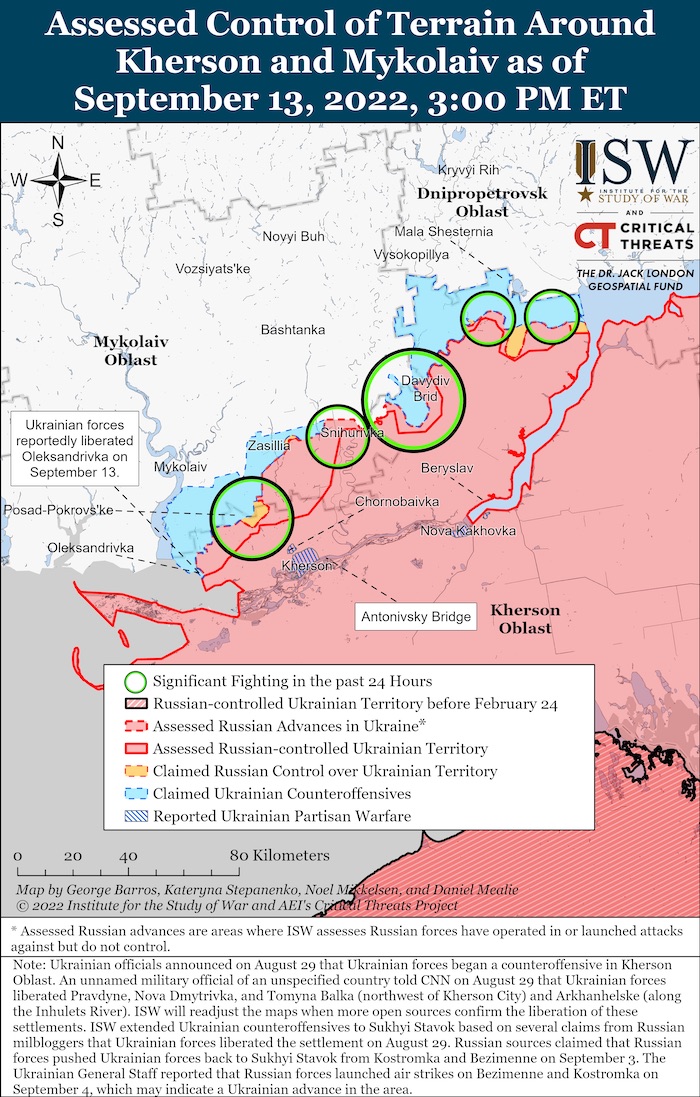
Military Updates
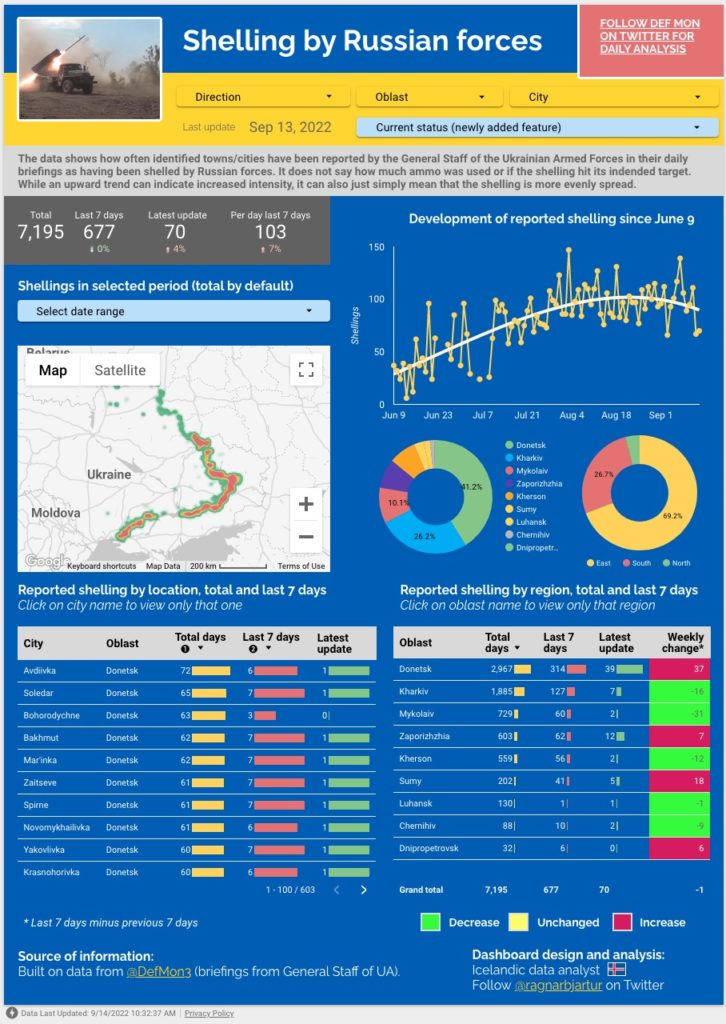
300 settlements and 150,000 population liberated in the Kharkiv Oblast, said Deputy Defense Minister Hanna Maliar.
Kyiv’s lightning offensive went much “better than expected – Ukraine’s Defense Minister
However, Ukraine has to be ready to protect liberated territories from possible Russian counter-offensive. https://t.co/0yr8O1X6hL
— Euromaidan Press (@EuromaidanPress) September 14, 2022
Russians left Kreminna, Luhansk Oblast, partisans raised Ukrainian flag, but Ukrainian military haven't yet entered the city - Luhansk Oblast Head Serhii Haidaihttps://t.co/379H5Ykypr
— Euromaidan Press (@EuromaidanPress) September 13, 2022
The liberation of Luhansk or Donetsk will cause a domino effect, bring down the Russian troops’ fronts and lead to political destabilization in the Russian Federation, said an adviser to the head of the Presidential Office Mikhaylo Podoliak. He noted that Ukraine needs air defense systems to protect critical infrastructure and more weapons to de-occupy Ukrainian territory, in particular Donbas.
Russian troops may retreat further – the Washington Post
US intelligence representatives believe that after Ukraine’s successful counteroffensive in the occupied Kharkiv Oblast, Russian troops may be forced to surrender other territories they captured.https://t.co/RNbXQcKdpd
— Euromaidan Press (@EuromaidanPress) September 13, 2022
Only in the southern direction, “over the past two weeks, more than 1,800 Russian soldiers killed, 2 planes and 2 helicopters shot down. More than 120 tanks, 130 artillery systems, 20 MLRS destroyed. With the use of the modern equipment provided by international partners, bridges, 150 command posts of the Russian Federation, about 70 ammunition depots destroyed,” said Major General of the Armed Forces of Ukraine Dmitry Dmytro Marchenko. He also commented on the low morale of the Russian officers in command of the Kherson direction.
Ukrainian Armed Forces shot down what appears to be an Iranian drone, a long-range kamikaze UAV Shahed-136, near Kupiansk, Kharkiv Oblast.
In the Kharkiv region, the Armed Forces of Ukraine captured a significant number of Russian high-level officers. Overall, the Ukrainian army captured over 100 Russian soldiers in recent days, including high-ranking officers.
The counteroffensive of the Armed Forces of Ukraine in the Kherson region is slower than in Kharkiv because of the differences in the landscape. The Kherson Oblast is an agricultural region with irrigation canals which the Russian military can use as defensive trenches, said the Minister of Defense of Ukraine Oleksii Reznikov.
️According to the most conservative estimates, the Russian troops spent about $100 million on Iskander and Caliber missiles to hit the Kharkiv Oblast on September 11.
Ukrainian counteroffensive became possible thanks to long-term preparation with USA and allies – NYT
But US officials insist that the merit of the offensive rests entirely with Mr. Zelenskyy and the Ukrainian military. https://t.co/fq61EPECG3
— Euromaidan Press (@EuromaidanPress) September 13, 2022
Regional Updates
https://twitter.com/EuromaidanPress/status/1569800713508626432
In the Kharkiv Oblast, the power and water supplies were interrupted by the Russian shelling and public transportation stopped working in the city of Kharkiv. The services were restored by the end of the day.
In the Zaporizhzhia Oblast, the Russian troops fled from Melitopol towards the occupied Crimea, according to the mayor Ivan Fedorov. Multiple cases of looting are reported.
⚡️Mayor: Russian forces retreating from occupied Melitopol to Crimea.
Ivan Fedorov, the mayor of Melitopol city in Zaporizhzhia Oblast, said that columns of Russian military hardware were detected further south in Chonhar, a village in Kherson Oblast at the entrance to Crimea.
— The Kyiv Independent (@KyivIndependent) September 13, 2022
According to British Defence Intelligence, (last 48 hours):
- Russia has highly likely deployed Iranian uncrewed aerial vehicles (UAV) in Ukraine for the first time. On 13 September 2022, Ukrainian officials reported that their forces had shot down a Shahed-136 UAV near Kupiansk, in the area of Ukraine’s successful ongoing offensive.
- The Shahed-136 is a one-way attack UAV with a claimed range of 2,500 kilometres. Similar Iranian-manufactured systems have likely been used in attacks in the Middle East, including against the oil tanker MT MERCER STREET in July 2021.
- Russia is almost certainly increasingly sourcing weaponry from other heavily sanctioned states like Iran and North Korea as its own stocks dwindle.
Losses of the Russian army
As of 14 September, the approximate losses of weapons and military equipment of the Russian Armed Forces from the beginning of the war to the present day:
⚰️russia's combat losses in Ukraine as of September 14
▪ 53650 killed soldiers (+300)
▪ 4665 APV (+3)
▪ 2180 tanks (+5)
▪ 1290 artillery systems (+11)
▪ 246 aircraft (+2) and 215 helicopters (+2)
▪ 15 boats and cutters#StopRussia #StandWithUkraine pic.twitter.com/xcewB09VG9— VoxUkraine (@voxukraine) September 14, 2022
https://twitter.com/EuromaidanPress/status/1569909807171223552
Humanitarian
Fake news about school teachers from the Russian Federation being detained in the liberated territories in the Kharkiv Oblast spread on social media. Russian teachers have never arrived in the temporarily occupied territories.
https://twitter.com/EuromaidanPress/status/1569793541194203136
Large volumes of humanitarian aid run past the expiration date at the Chernihiv private warehouses since March. Canned food, cereals, baby food and other humanitarian aid are kept in private warehouses owned by the Chernihiv Regional Military Administration staff instead of being distributed.
Russian occupiers set up torture chamber in Balakliia, Kharkiv Oblast
According to the Police Investigation Head in the Kharkiv Oblast, during the occupation of Balakliia, the Russian invaders set up a prison, where they tortured at least 40 Ukrainians.https://t.co/pNDMwvjybx
— Euromaidan Press (@EuromaidanPress) September 14, 2022
In occupied cities, the Russian military set up torture rooms in the local police departments, where they kept Ukrainian citizens for extended periods of time. Several were allegedly beaten to death.
Residents of Ivanivka, a liberated village in Kherson Oblast, tell how Russians looted, tortured and murdered locals, and strategies local women pursued in attempts to avoid getting rapedhttps://t.co/gm5iICjPax
— Euromaidan Press (@EuromaidanPress) September 13, 2022
️️Environmental
The Russian invaders are preparing another shelling at the Zaporizhzhia NPP. There may be attacks on other nuclear power plants in Ukraine, according to Ukrainian intelligence. “The Russian aggressor is systematically, methodically shelling the entire energy infrastructure of Ukraine, and this, of course, can ultimately affect other nuclear facilities, other nuclear power plants.”
Legal
Ukraine’s Defense Minister Oleksii Reznikov announced plans to hold the Nuremberg Tribunal for the Russian military, possibly in Mariupol or Kharkiv.
In the liberated Balakliya, the Russian occupational troops left behind mass graves.
9 EU countries don't issue tourist visas to Russians
Latvia, Lithuania, Estonia, Poland, the Czech Republic, Slovakia, Denmark, Belgium, and the Netherlands do not accept visa documents from Russian tourists. https://t.co/nkoeaih7on
— Euromaidan Press (@EuromaidanPress) September 13, 2022
Latvia, Lithuania, Estonia, Poland, the Czech Republic, Slovakia, Denmark, Belgium, and the Netherlands stopped issuing tourist visas for Russian citizens. Italy, Spain, Greece, France, Hungary, and Cyprus continue to issue national tourist visas but not Schengen visas.
Support
Armed Forces of Ukraine received five armored SUVs Land Rover Defender Snatch from the Vadim Stolar Foundation. The Vadim Stolar Foundation has also donated more than 20,000 pieces of clothing, more than 100 units of thermal imagers and drones, and other goods.
The IMF allocated $1.4 billion in financial support to Ukraine. Zelenskyy discussed uture steps to strengthen Ukraine’s financial stability with the IMF Managing Director Kristalina Georgieva.
New Developments
Russian officials asked Ukraine to resume negotiations after the successful Ukrainian counteroffensive, but Kyiv refused - Deputy PM Olha Stefanishyna
According to Stefanishyna, Kyiv will start negotiations only after achieving its military goals.https://t.co/B1ioxreIN1
— Euromaidan Press (@EuromaidanPress) September 13, 2022
EU not to cap price on Russian gas – media
The draft regulation aimed to solve the energy crisis in the EU doesn’t include setting a maximum price for Russian gas or for any imported gas.https://t.co/SHHPvlRQdy
— Euromaidan Press (@EuromaidanPress) September 13, 2022
The Kremlin does not intend to announce mobilization “at the moment,” said Putin’s Press Secretary Dmitry Peskov.
German companies Walter, Schunk, and Kemmler continue to operate in Russia. This gives desperate Moscow much-needed access to modern technologies & feeds Putin’s destructive war in Ukraine, helping it keep servicing & producing airplanes, missiles & tankshttps://t.co/4DRTTntHdQ
— Euromaidan Press (@EuromaidanPress) September 13, 2022
German Chancellor Scholz held a 90-minute telephone conversation with Putin regarding the situation in Ukraine. Scholz urged Putin to find a diplomatic solution based on a ceasefire, the complete withdrawal of Russian troops and respect for the territorial integrity and sovereignty of Ukraine as soon as possible. Scholz stressed that any further Russian steps towards annexation would not go unanswered and would not be recognized under any circumstances, and also spoke about the need to ensure the safety of the Zaporizhzhia nuclear power plant.
https://twitter.com/EuromaidanPress/status/1569741070354849797
49 Armenian military were killed in clashes with the Azerbaijani army during the aggravation on the border between Armenia and Azerbaijan.
Ukraine’s GDP to rise by 4.6% in 2023 - Ukraine’s government
According to Ukraine’s PM Denys Shmyhal, Ukraine’s economy may fall by 0.4% or grow by 10% the following year depending on the situation on the front. https://t.co/BdfqjM1aYB
— Euromaidan Press (@EuromaidanPress) September 14, 2022
Assessment
- On the war.
The Institute for the Study of War has made the following assessment as of Saturday 14 September 2022:
The Kremlin acknowledged its defeat in Kharkiv Oblast, the first time Moscow has openly recognized a defeat since the start of the February 2022 invasion of Ukraine. Kremlin officials and state media propagandists are extensively discussing the reasons for the Russian defeat in Kharkiv Oblast, a marked change from their previous pattern of reporting on exaggerated or fabricated Russian successes with limited detail.[1] The Kremlin never admitted that Russia was defeated around Kyiv or, later, at Zmiinyi (Snake) Island, framing the retreat from Kyiv as a decision to prioritize the “liberation” of Donbas and the withdrawal from Zmiinyi (Snake) Island as a “gesture of goodwill.”[2] The Russian Ministry of Defense (MoD) originally offered a similar explanation for the Russian failure in Kharkiv, claiming that Russian forces were withdrawing troops from Kharkiv Oblast to regroup, but this false narrative faced quick and loud criticism online.[3] The Kremlin’s acknowledgment of the defeat is part of an effort to mitigate and deflect criticism for such a devastating failure away from Russian President Vladimir Putin and onto the Russian Ministry of Defense (MoD) and the uniformed military command.
Kremlin sources are now working to clear Putin of any responsibility for the defeat, instead blaming the loss of almost all of occupied Kharkiv Oblast on underinformed military advisors within Putin’s circle.[4] One member of the Kremlin’s Council for Interethnic Relations, Bogdan Bezpalko, even stated that military officials who had failed to see the concentration of Ukrainian troops and equipment and disregarded Telegram channels that warned of the imminent Ukrainian counter-offensive in Kharkiv Oblast should have their heads ”lying on Putin’s desk.”[5] ISW has previously reported that the Kremlin delayed Putin‘s meeting with Russian defense officials immediately after the withdrawal of troops from around Kharkiv, increasing the appearance of a rift between the Kremlin and the Russian MoD.[6] The Kremlin’s admission of defeat in Kharkiv shows that Putin is willing and able to recognize and even accept a Russian defeat at least in some circumstances and focus on deflecting blame from himself.
Several members of the Russian State Duma expressed concern about the dire situation on the frontlines in Ukraine during the Duma’s first plenary meeting of its autumn session on September 13. Leader of the Russian Communist Party Gennady Zyuganov stated that Russia needs to announce full mobilization because the Russian “special military operation” is a war.[7] Zyuganov said that one can end a “special military operation” at any time, but that a war can end only in victory or defeat, and “we have no right to lose” this war. Leader of the “Fair Russia—For Truth” Party Sergey Mironov called for social “mobilization,” in which regular Russians would pay attention more to the war in Ukraine, rather than for full military mobilization. Leader of the Russian Liberal Democratic Party Leonid Slutsky also noted that Russia will continue to fight in the geopolitical “scrum” with the West. All three MPs had publicly advocated for Putin to recognize the independence of the Donetsk and Luhansk People’s Republics (DNR and LNR) before the February invasion and were instrumental in setting information conditions for the invasion itself.[8] The MPs also discussed a December date for the next hearing on a bill that will simplify the delivery of the semiannual conscription notices.[9] The bill, which is likely to pass, will allow Russian military recruitment centers to send out conscription notices via mail instead of presenting them in person and will oblige men who have not received a notice in the mail to show up at the local recruitment center anyway.[10]
The Kremlin is likely seeking to use the defeat in Kharkiv to facilitate crypto mobilization efforts. Zyuganov’s, Mironov’s, and Slutsky’s statements could be aimed at raising concern and patriotism among Russians to encourage them to get more involved in the war. The bill could further facilitate the ongoing crypto mobilization campaign, which aims to promote recruitment into contract service via deception, coercion, or promised financial rewards. Recruitment centers throughout Russia have been delivering unofficial summonses that look like conscription notices via mail and phone calls, but many men are aware that Russian law requires military recruitment centers to issue conscription notices in person.[11] Russian men who have responded to the unofficial summonses have recounted recruiters attempting to persuade or pressure them into signing a military contract. The bill legalizing mailed conscription notices will facilitate this dishonest practice. Both the bill and MPs’ statements may evoke fear of general mobilization among men, which could incentivize some to sign military contracts and receive financial bonuses for volunteering, as opposed to being conscripted and forced to serve without such compensation.
Nothing in the Duma bill suggests that Putin is preparing to order general mobilization, and it is far from clear that he could do so quickly. Large-scale conscription would very likely overwhelm the Russian MoD’s ability to induct, train, and equip new soldiers, particularly since the Russian training base appears to be strained in preparing the limited numbers of volunteer battalions currently being fielded. Russia would likely first have to expand its training base significantly, a time-consuming process, and then find and prepare for combat sufficient equipment to kit out large numbers of new units before it could even begin to handle a large influx of new conscripts. Widely-reported Russian materiel shortages suggest deep failures in the Russian military industry that would make generating the necessary equipment, ammunition, and supplies for a large conscript army very difficult. ISW has not identified any indicators that preparations for such activities have been ordered or are underway.
The Kremlin has adopted narratives that echo longstanding milblogger demands and complaints, suggesting that Putin seeks to appease and win back the critical milblogger community rather than censor it. Russian milbloggers have long complained about the Russian MoD and the military high command, and now the Kremlin state media is openly expressing dissatisfaction with the progress of the war and the lack of situational awareness of events on the ground.[12] Milbloggers are advertising Telegram channels covering frontline developments 24/7 and urging readers to subscribe if they “believe” in Putin.[13] Kremlin-controlled and Kremlin-influenced media are now openly calling for an intensive missile campaign against Ukrainian civilian critical infrastructure and transit routes, an idea with broad support among many milbloggers.[14] These new calls are a stark departure from the Kremlin‘s previous line claiming that Russian forces did not target civilian infrastructure, and this new narrative is earning the Kremlin public support among milbloggers. Slutsky’s statement at the Duma meeting pointing to the disinterest of most Russian civilians in the war echoes frequent milblogger complaints about the harmful side effects of conducting a limited war.[15]
Russia’s defeat in Kharkiv Oblast is causing panic among Russians in occupied Ukrainian territories, servicemen, and milbloggers. The Ukrainian Main Military Intelligence (GUR) reported that Russian authorities in Crimea urged their families to flee to Russia, while employees of the Russian Federal Security Service (FSB) are selling their homes on the peninsula and are urgently evacuating their families due to Ukrainian counter-offensives.[16] The Ukrainian General Staff reported that forcibly mobilized proxy units are suffering low morale and psychological problems.[17] Russian milbloggers are increasingly worrying about Ukrainian counter-offensives in different areas along the Donetsk-Zaporizhzhia Oblasts frontline, and preemptively identifying vulnerable Russian positions.[18]
Russia’s military failures in Ukraine are likely continuing to weaken Russia’s leverage in the former Soviet Union. Armenia accused Azerbaijan of violating a Russian-brokered ceasefire and attacking Armenian forces along the Azerbaijan-Armenian border on September 13.[19] Armenian Prime Minister Nikol Pashinyan held a call with Russian President Vladimir Putin and convened a meeting of the Collective Security Treaty Organization (CSTO) member states later in the day but did not invoke the CSTO’s collective security agreement, according to government readouts of both meetings.[20] The Russian Ministry of Foreign Affairs did not comment on whether the Kremlin would fulfill its CSTO obligations to Armenia if Azerbaijan continued to press its attack.[21] Russia’s hedging approach may damage Russia’s relationship with Armenia and with other CSTO member states, particularly If Russia cannot provide military or peacekeeping support.
The CSTO is a Russia-created and Russia-dominated intergovernmental military alliance that the Kremlin claims is about collective security, but typically uses to justify or further its hybrid war aims. The degraded Russian military likely does not have sufficient forces to enforce a ceasefire or to deploy additional peacekeepers to the area after six months of devastating war in Ukraine. ISW reported on March 13 that Russia pulled 800 personnel from Russia’s base in Armenia and elements of its Nagorno-Karabakh “peacekeeping deployment” to replenish early losses in Ukraine.[22] ISW has observed no redeployments to Nagorno-Karabakh or Russia’s base in Armenia since then.
Key Takeaways
- The Kremlin has recognized its defeat in Kharkiv Oblast, the first defeat Russia has acknowledged in this war. The Kremlin is deflecting blame from Russian President Vladimir Putin and attributing it instead to his military advisors.
- The Kremlin is likely seeking to use the defeat in Kharkiv to facilitate crypto mobilization efforts by intensifying patriotic rhetoric and discussions about fuller mobilization while revisiting a Russian State Duma bill allowing the military to send call-ups for the regular semiannual conscription by mail. Nothing in the Duma bill suggests that Putin is preparing to order general mobilization, and it is far from clear that he could do so quickly in any case.
- The successful Ukrainian counter-offensive around Kharkiv Oblast is prompting Russian servicemen, occupation authorities, and milbloggers to panic.
- Russia’s military failures in Ukraine are likely continuing to weaken Russia’s leverage in the former Soviet Union as Russia appears unwilling to enforce a violated ceasefire it brokered between Armenia and Azerbaijan or to allow Armenia to invoke provisions of the Russia-dominated Collective Security Treaty Organization in its defense.
- Ukrainian troops likely continued ground attacks along the Lyman-Yampil-Bilohorivka line in northern Donetsk Oblast and may be conducting limited ground attacks across the Oskil River in Kharkiv Oblast.
- Russian and Ukrainian sources indicated that Ukrainian forces are continuing ground maneuvers in three areas of Kherson Oblast as part of the ongoing southern counter-offensive.
- Russian troops made incremental gains south of Bakhmut and continued ground attacks throughout Donetsk Oblast.
- Ukrainian forces provided the first visual evidence of Russian forces using an Iranian-made drone in Ukraine on September 13.

